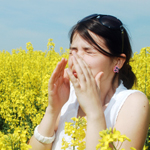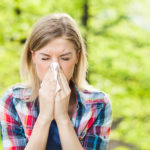Tryptase Levels: Dealing With Troublesome Allergies?
I’ve been told my tryptase levels are too high. Can you tell me more about what tryptase is, and give me some advice on how to lower my levels?
Andrew Weil, M.D. | October 18, 2011

Tryptase is an enzyme that plays a role in allergic reactions. It is found primarily in mast cells – specialized cells located throughout the body that become activated in response to the presence of an allergen. Mast cells can also release histamine, another chemical involved in allergic reactions.
Concentrations of tryptase in the body are usually pretty low, but they rise quickly when mast cells are activated, then tend to return to normal after several hours or days. I discussed your question about lowering tryptase levels with Randy Horwitz, M.D., Ph.D., medical director of the Arizona Center for Integrative Medicine. Dr. Horwitz is an expert on allergy and immunology. He noted that tryptase is normally contained within cells except in cases where mast cells degranulate – i.e., release their contents – as part of an allergic response. Tryptase levels are highest during severe, life-threatening allergic reactions (anaphylaxis) and with mastocytosis, a rare disease that results when there are too many mast cells in the body.
Dr. Horwitz explained that plasma levels of tryptase are usually too low to measure in individuals who don’t have mastocytosis or anaphylaxis. He said a better question is how to prevent mast cells from degranulating and releasing tryptase, as well as histamine and other chemicals that mediate allergic reactions. Products that can do this include cromolyn (Nasalcrom, Gastrocrom, Intal), a drug that prevents the release of histamines and quercetin, a bioflavonoid obtained from buckwheat and citrus fruits. Quercetin stabilizes the membranes of mast cells. The recommended dose is 400 mg twice a day between meals. Quercetin can help manage seasonal allergies such as hay fever – you begin taking it a week or two before the pollen season is expected to begin and continue taking it until the end. It may help with non-seasonal allergies as well.
Andrew Weil, M.D.










